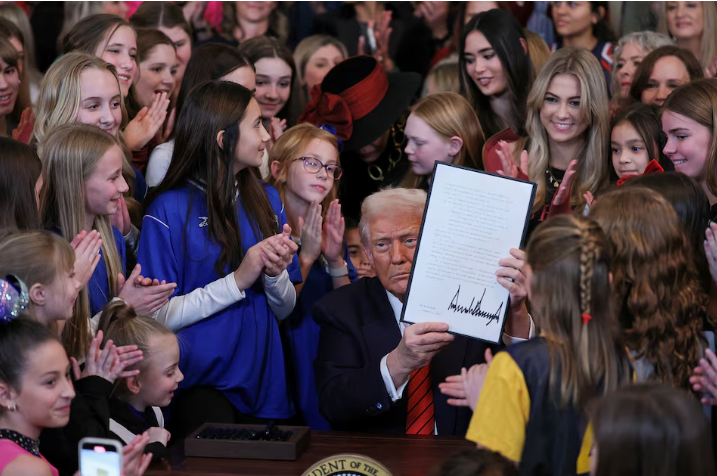President Donald Trump’s executive order restricting transgender women and girls from playing in female sports offers little guidance on enforcing the ban beyond looking into the “best practices” of those states with similar laws, which have mostly proven limited or impractical.
Current options for enforcing the ban range from looking at birth certificates, which can be altered, to inspecting the bodies of children, an alternative that most would find unpalatable at best. “Anti-trans school sports bans are difficult to enforce because they rely on sex testing and body policing for implementation and enforcement,” said Chris Mosier, a transgender athlete and founder of transathlete.com, a website on school policies related to transgender athletes.

The issue is one that sports associations, schools and states have wrestled with for decades, with so-called “naked parades” and gynecological exams used to confirm sex for some events in the 1960s, though those methods were later abandoned.
Of the 25 states that have laws resembling Trump’s new order, only 12 specify a procedure for determining a student’s sex. In most cases, it involves checking birth certificates, according to the Movement Advancement Project, a think tank that advocates for transgender rights.
Other states look to affidavits from parents, students or healthcare providers.
“An increased scrutiny on athletes’ bodies creates serious harm to all women and girls who are perceived as ‘more masculine’ due to being queer, intersex, or otherwise out of alignment with narrow, white-centric norms of femininity,” said Mosier.
In 2020, Idaho became the first state to pass a law prohibiting transgender women and girls from playing on female-designated sports teams, mandating that a student whose sex was in dispute would have to provide a health exam and consent form from a healthcare provider.

The healthcare provider could verify the student’s sex by relying on their genetic makeup, reproductive anatomy or naturally produced testosterone levels, according to the law, which has since been blocked by the 9th U.S. Circuit Court of Appeals.
A transgender woman, Lindsay Hecox, sued to block the law after she would not qualify to join the female track team at Boise State University due to the tests for biological sex.
For at least some of those who support the president’s order, the message it sends is powerful and overdue, regardless of any issues over enforcement that may surface.
“The executive order … is important legally but also vital for the long-overdue message it sends to women and girls: your rights matter,” said Kristen Waggoner, CEO and president of Alliance Defending Freedom, which describes itself as a conservative Christian legal advocacy group. “For too long, our daughters have heard the opposite message from those in power.”
A SITUATION NOBODY WANTS
Cheryl Cooky, a professor at Purdue University, said that the Olympics previously relied on testosterone testing, a highly flawed method because of differences in how bodies use the hormone. Similar tests in universities and high schools would be inappropriate because they do not necessarily show athletic performance, she said.
“Are we going to test nine-year-olds for testosterone?” Cooky asked. “Are we going to make nine-year-old boys and girls undergo physical inspections? This raises a whole host of issues. High schools and colleges don’t have the resources that the Olympic committee might,” she added.
To enforce Trump’s ban, she said, schools may end up relying on reports from parents or other students who suspect athletes may not be biological girls because of how they look or even if a student is exceptionally athletic, typically considered a male attribute.
“This ban is going to implicate all girls and women regardless of whether or not they are trans or cis gender,” she said.
A West Virginia law banning transgender students from playing sports according to their gender identity also relies on birth certificates and physical exams.
The law, which is also currently blocked by a judge, was challenged after an 11-year-old transgender girl wanted to run track and cross-country on the female team in middle school.
Relying on student birth certificates can be difficult because transgender youth in many states have the ability to change the documents, said Elana Redfield, federal policy director at the Williams Institute at the UCLA School of Law.
One transgender boy who updated his birth certificate to display his sex as male later filed a federal discrimination lawsuit against his Florida school district for not allowing him to use the male restroom. Two federal courts ruled in his favor, but the appeals court reversed its decision in 2023 after a rehearing before a panel comprising all of its judges.
Without a more consistent enforcement mechanism, some authorities have floated the idea of inspecting the bodies of students to determine their assigned sex at birth, Redfield said.
“The concern is that you’re creating a situation where the school officials or some other entity would have to actually look at the physical bodies of children, which nobody wants,” she said.